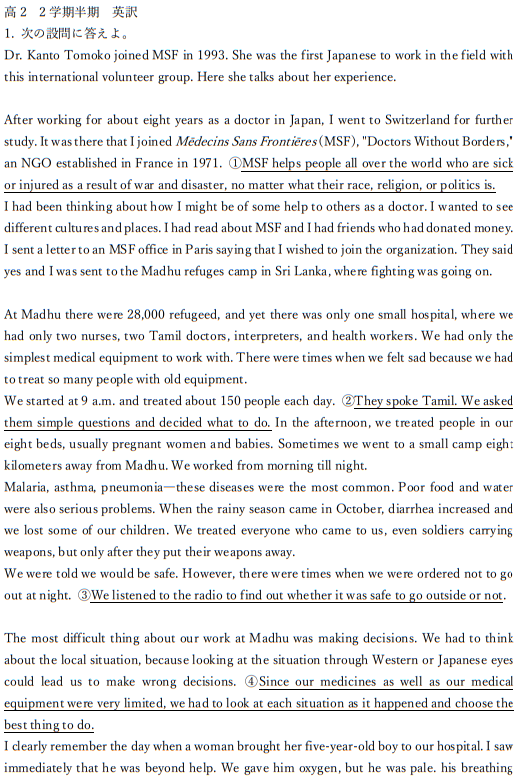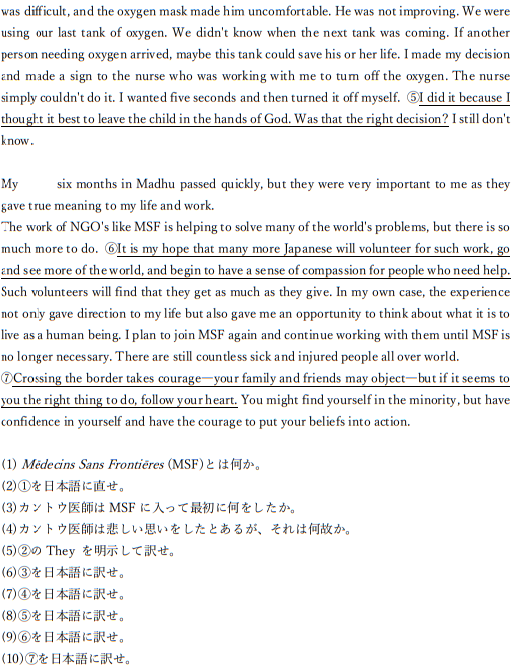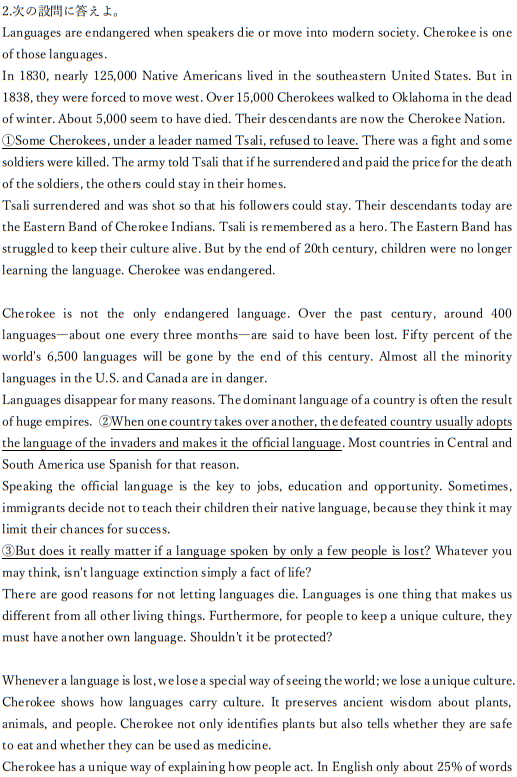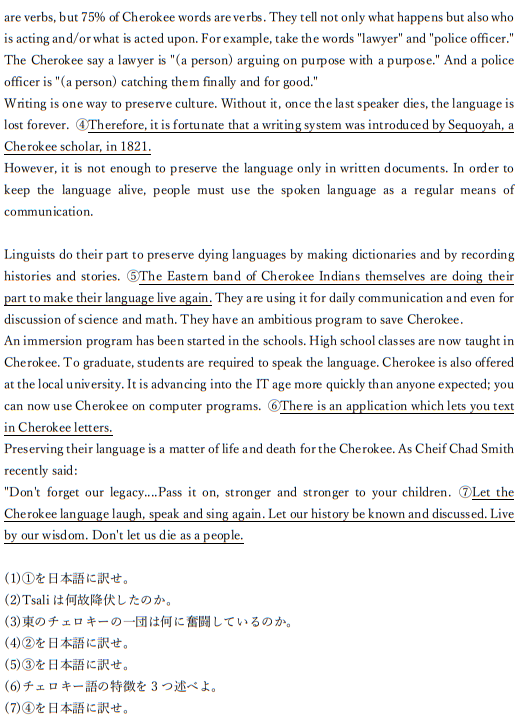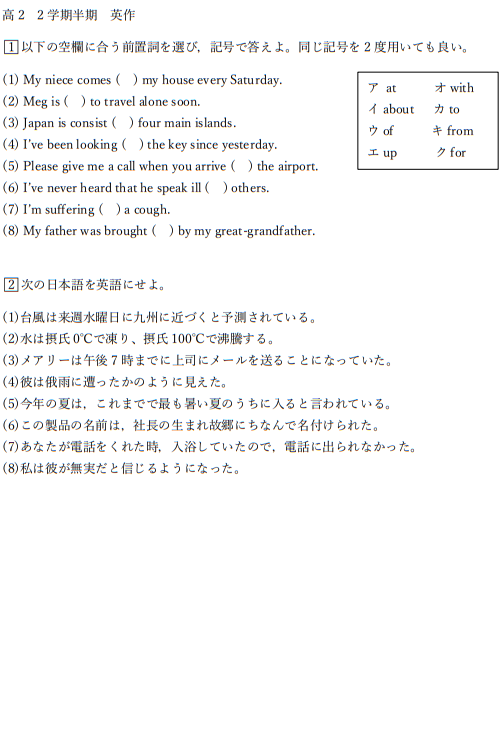Tosastudy-japa
1.例文①
Dr. Kanto Tomoko joined MSF in 1993. She was the first Japanese to work in the field with this international volunteer group. Here she talks about her experience.
After working for about eight years as a doctor in Japan, I went to Switzerland for further study. It was there that I joined Mēdecins Sans Frontiēres (MSF), "Doctors Without Borders," an NGO established in France in 1971. MSF helps people all over the world who are sick or injured as a result of war and disaster, no matter what their race, religion, or politics is.
I had been thinking about how I might be of some help to others as a doctor. I wanted to see different cultures and places. I had read about MSF and I had friends who had donated money. I sent a letter to an MSF office in Paris saying that I wished to join the organization. They said yes and I was sent to the Madhu refuges camp in Sri Lanka, where fighting was going on.
At Madhu there were 28,000 refugeed, and yet there was only one small hospital, where we had only two nurses, two Tamil doctors, interpreters, and health workers. We had only the simplest medical equipment to work with. There were times when we felt sad because we had to treat so many people with old equipment.
We started at 9 a.m. and treated about 150 people each day. They spoke Tamil. We asked them simple questions and decided what to do. In the afternoon, we treated people in our eight beds, usually pregnant women and babies. Sometimes we went to a small camp eight kilometers away from Madhu. We worked from morning till night.
Malaria, asthma, pneumonia―these diseases were the most common. Poor food and water were also serious problems. When the rainy season came in October, diarrhea increased and we lost some of our children. We treated everyone who came to us, even soldiers carrying weapons, but only after they put their weapons away.
We were told we would be safe. However, there were times when we were ordered not to go out at night. We listened to the radio to find out whether it was safe to go outside or not.
The most difficult thing about our work at Madhu was making decisions. We had to think about the local situation, because looking at the situation through Western or Japanese eyes could lead us to make wrong decisions. Since our medicines as well as our medical equipment were very limited, we had to look at each situation as it happened and choose the best thing to do.
I clearly remember the day when a woman brought her five-year-old boy to our hospital. I saw immediately that he was beyond help. We gave him oxygen, but he was pale. his breathing was difficult, and the oxygen mask made him uncomfortable. He was not improving. We were using our last tank of oxygen. We didn't know when the next tank was coming. If another person needing oxygen arrived, maybe this tank could save his or her life. I made my decision and made a sign to the nurse who was working with me to turn off the oxygen. The nurse simply couldn't do it. I wanted five seconds and then turned it off myself. I did it because I thought it best to leave the child in the hands of God. Was that the right decision? I still don't know.
My six months in Madhu passed quickly, but they were very important to me as they gave true meaning to my life and work.
The work of NGO's like MSF is helping to solve many of the world's problems, but there is so much more to do. It is my hope that many more Japanese will volunteer for such work, go and see more of the world, and begin to have a sense of compassion for people who need help. Such volunteers will find that they get as much as they give. In my own case, the experience not only gave direction to my life but also gave me an opportunity to think about what it is to live as a human being. I plan to join MSF again and continue working with them until MSF is no longer necessary. There are still countless sick and injured people all over world.
Crossing the border takes courage―your family and friends may object―but if it seems to you the right thing to do, follow your heart. You might find yourself in the minority, but have confidence in yourself and have the courage to put your beliefs into action.
3.例文②
Languages are endangered when speakers die or move into modern society. Cherokee is one of those languages.
In 1830, nearly 125,000 Native Americans lived in the southeastern United States. But in 1838, they were forced to move west. Over 15,000 Cherokees walked to Oklahoma in the dead of winter. About 5,000 seem to have died. Their descendants are now the Cherokee Nation.
Some Cherokees, under a leader named Tsali, refused to leave. There was a fight and some soldiers were killed. The army told Tsali that if he surrendered and paid the price for the death of the soldiers, the others could stay in their homes.
Tsali surrendered and was shot so that his followers could stay. Their descendants today are the Eastern Band of Cherokee Indians. Tsali is remembered as a hero. The Eastern Band has struggled to keep their culture alive. But by the end of 20th century, children were no longer learning the language. Cherokee was endangered.
Cherokee is not the only endangered language. Over the past century, around 400 languages―about one every three months―are said to have been lost. Fifty percent of the world's 6,500 languages will be gone by the end of this century. Almost all the minority languages in the U.S. and Canada are in danger.
Languages disappear for many reasons. The dominant language of a country is often the result of huge empires. When one country takes over another, the defeated country usually adopts the language of the invaders and makes it the official language. Most countries in Central and South America use Spanish for that reason.
Speaking the official language is the key to jobs, education and opportunity. Sometimes, immigrants decide not to teach their children their native language, because they think it may limit their chances for success.
But does it really matter if a language spoken by only a few people is lost? Whatever you may think, isn't language extinction simply a fact of life?
There are good reasons for not letting languages die. Languages is one thing that makes us different from all other living things. Furthermore, for people to keep a unique culture, they must have another own language. Shouldn't it be protected?
Whenever a language is lost, we lose a special way of seeing the world; we lose a unique culture. Cherokee shows how languages carry culture. It preserves ancient wisdom about plants, animals, and people. Cherokee not only identifies plants but also tells whether they are safe to eat and whether they can be used as medicine.
Cherokee has a unique way of explaining how people act. In English only about 25% of words are verbs, but 75% of Cherokee words are verbs. They tell not only what happens but also who is acting and/or what is acted upon. For example, take the words "lawyer" and "police officer." The Cherokee say a lawyer is "(a person) arguing on purpose with a purpose." And a police officer is "(a person) catching them finally and for good."
Writing is one way to preserve culture. Without it, once the last speaker dies, the language is lost forever. Therefore, it is fortunate that a writing system was introduced by Sequoyah, a Cherokee scholar, in 1821.
However, it is not enough to preserve the language only in written documents. In order to keep the language alive, people must use the spoken language as a regular means of communication.
Linguists do their part to preserve dying languages by making dictionaries and by recording histories and stories. The Eastern band of Cherokee Indians themselves are doing their part to make their language live again. They are using it for daily communication and even for discussion of science and math. They have an ambitious program to save Cherokee.
An immersion program has been started in the schools. High school classes are now taught in Cherokee. To graduate, students are required to speak the language. Cherokee is also offered at the local university. It is advancing into the IT age more quickly than anyone expected; you can now use Cherokee on computer programs. There is an application which lets you text in Cherokee letters.
Preserving their language is a matter of life and death for the Cherokee. As Cheif Chad Smith recently said:
"Don't forget our legacy....Pass it on, stronger and stronger to your children. Let the Cherokee language laugh, speak and sing again. Let our history be known and discussed. Live by our wisdom. Don't let us die as a people.
6.予想問題
予想問題のリンクはこちら
